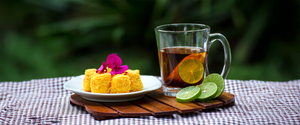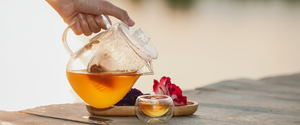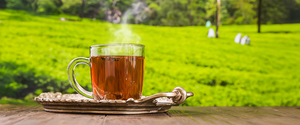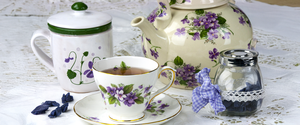Tea is an experience, a journey of flavours and aromas that captivates the senses. Among the many varieties, teas with floral notes stand out for their delicate, sweet fragrance that evokes the essence of blooming flowers. These teas offer a subtle floral aroma when brewed, transporting you to a serene garden. But it's essential to differentiate between teas with floral notes and floral teas.
Teas with floral notes are made from the traditional tea leaves of the Camellia Sinensis bush, which, upon brewing, release a naturally sweet, floral aroma. These teas are not infused with flowers but derive their floral characteristics purely from the leaves' inherent properties. On the other hand, floral teas—often referred to as herbal teas—are crafted from dried petals of flowers like jasmine, rose, hibiscus, and others. They contain no tea leaves and are celebrated for their vivid floral flavours. While both varieties are enchanting, teas with floral notes offer a more nuanced, complex taste experience.
In this article, we will delve deeper into the unique features of teas with floral notes, explore the factors influencing their aroma, and discover how to brew them for the best tasting experience.
Features and Attributes of Teas with Floral Notes
Teas with floral notes are admired for their complex fragrance and subtle sweetness. Below are the key features that make these teas so captivating.
- Natural Aroma
The most distinguishing feature of teas with floral notes is their natural, light floral fragrance. This aroma is not artificially added but comes from the oxidation and processing of the tea leaves.
- Delicate Flavour Profile
These teas are mild and elegant, with a flavour that gently lingers on the palate. The floral notes do not overpower but complement the tea’s natural sweetness and earthiness.
- Smooth Finish
Teas with floral notes are often characterized by a smooth, rounded finish. There is no bitterness or astringency, making these teas a perfect choice for those who appreciate subtlety.
- Variety of Colours
When brewed, these teas can range in colour from pale golden to deep amber, depending on the type of tea and its processing.
The Factors That Influence Floral Aromas in Tea
Several factors contribute to the characteristic floral aroma of certain teas. These factors vary depending on geography, season, and cultivation methods. Let’s explore them below.
- Climate and Geography
The climate and location where tea is grown significantly impact its floral characteristics. Tea plants grown at higher altitudes, like those in Darjeeling, are exposed to cooler temperatures and misty weather, which enhances their floral notes. The thin air and unique environmental conditions allow the leaves to mature slowly, resulting in a more complex flavour profile.
- Season and Tea Flushes
Teas with floral notes often come from the first or second flushes of the growing season. In Darjeeling, the first flush (spring harvest) is known for its lively, floral aroma, while the second flush (summer harvest) offers a richer, muscatel flavour with subtle floral undertones. These seasonal differences in the tea leaves create distinct flavours and aromas, making each cup a unique experience.
- Processing Techniques
How tea leaves are processed can influence their floral aroma. Lightly oxidized teas, like green and white teas, retain more of their natural floral notes, while oolong teas, which undergo partial oxidation, develop a deeper, more pronounced floral fragrance. The careful handling and rolling of the leaves during processing release essential oils that contribute to the floral aroma.
Savouring the Delicate Floral Taste: Brewing Tips for Floral Teas
Brewing teas with floral notes is an art, and getting it right ensures you fully appreciate their delicate, nuanced flavours. Here are some tips to brew the perfect cup of floral tea.
- Water Temperature
The key to unlocking the floral notes in tea is using the correct water temperature. For teas like Darjeeling or green teas with floral notes, the water should be heated to around 80-85°C (175-185°F). Boiling water can burn the leaves and mask the tea’s natural sweetness.
- Steeping Time
Over-steeping can result in bitterness, even in the most delicately flavoured teas. A general rule is to steep floral teas for about 2-3 minutes. This allows the tea leaves to release their natural oils and aromas without overpowering the taste. (to add one teaspoon recommended 1.2g per 150ml cup)
- Use Fresh, Filtered Water
Floral teas are best brewed with fresh, filtered water to maintain their delicate flavour profile. Minerals and impurities in tap water can alter the taste, so it's always a good idea to use clean water.
- Serve Without Additives
Teas with floral notes are best enjoyed without milk or sugar. Their light, fragrant flavour is subtle and can easily be overwhelmed by added sweeteners. If you prefer a bit of sweetness, a small drop of honey can enhance the floral essence without masking it.
Where to Buy the Best Flower-scented Teas?
If you wish to experience the floral elegance in every cup, look nowhere else other than Goodricke- the most renowned tea brand known for delivering the best in tea. In Goodricke’s range of Darjeeling tea, Badamtam and Margaret’s Hope are celebrated for their exquisite floral notes. Goodricke’s Symphony Chamomile Green Tea also beautifully blends the calming essence of chamomile flowers with the tea’s natural sweetness, offering a perfect example of floral harmony. For the best floral-flavoured tea experience, choose Goodricke!
The Takeaway
Teas with floral notes offer a sophisticated, sensory experience that is as refreshing as it is enchanting. These teas, sourced from the traditional Camellia Sinensis bush, provide a naturally sweet and fragrant cup without the need for additional floral infusions. Factors like geography, climate, and seasonal flushes all contribute to the floral aroma, and brands like Goodricke have perfected the art of capturing these delicate notes in their range of Darjeeling teas.
Whether you're a seasoned tea lover or new to exploring floral flavours, brewing these teas with care and attention will reward you with a truly delightful experience. So, the next time you seek a moment of tranquillity, brew a cup of tea with floral notes and let the natural sweetness of the leaves transport you to a world of floral delight.












